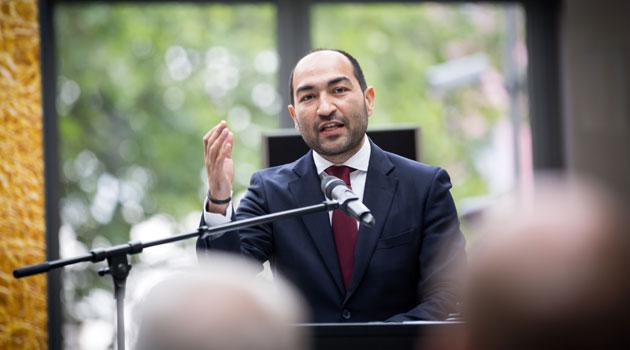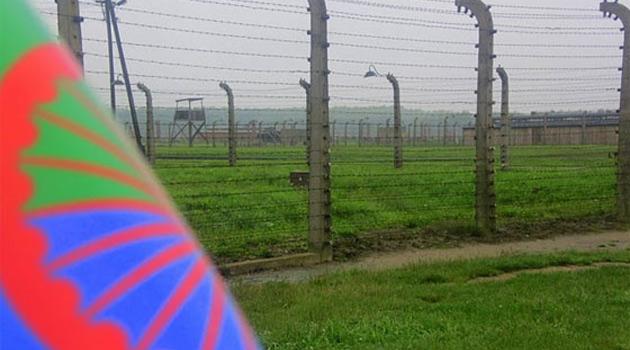Željko Jovanović: Roma Resistance Day as a Moral Compass

On May 16, we remember and celebrate the courage of Roma resistance. On that day in 1944, a Roma uprising disrupted the Nazi plan for the annihilation of some 6500 inhabitants of the so-called Gypsy Camp at Auschwitz-Birkenau. The extermination finally took place in August, but this act of resistance has become part of our collective memory thanks to the survivors’ testimonies and to organizations like the Voice of Roma in France and others expanding our awareness about it.
The legacy of the Roma uprising orients us in finding value and meaning for our resistance in the present day. Some people, cynical about Roma movements and advocates, claim that we are ineffective or meaningless because what we achieve has no visible impact on the lives of millions of our people. According to this line of thought, one could conclude that those who stood up on May 16 should not be remembered and celebrated, but rather blamed and forgotten because they failed and were killed.
However, the Roma uprising should be seen in relation to what the Roma prisoners courageously stood up against: the most powerful killing machine of all time. That perspective gives meaning to our resistance and resonates across time and space.
In our struggles today, we must not be confused and disoriented by defeatism and cynicism. These have not led any person, group or nation in history to make progress and they should not guide us today. Within our movements, introspection and the condemnation of wrongs are necessary for ethical and political advancement. But, in the bigger picture, we need to look what we are up against: the force of racists and the far right that is awakening what Ceija Stojka pictured as a “sleeping Auschwitz”. This evil force does not only attack the Roma; it is destabilizing our countries, the European Union and the world again.
This gives us a clearer picture of the position and relevance of Roma advocates today. Take for example, the Supreme Court decision in Hungary ruling against the unlawful school segregation of Roma. We should celebrate the courage and resistance of the children and parents who took the government to court, the Chance for Children Foundation that led the case, the We Belong Here movement that led the February protest against the government’s obstruction of justice, as well as the judges of the Court and all who spoke out against forceful and unjust segregation.
When the ruling Fidesz party eventually starts amending the law to make segregation legal, the cynics might again say, “The Roma advocates have not succeeded!” The moral compass of Roma resistance, however, makes us see this case as a victory of historic proportions because it is a win against Fidesz, which holds absolute political power in Hungary, and which also spreads racism and white supremacy across Europe without repercussion. It is a victory in the name of justice even when the EU cannot uphold the rule of law in Hungary.
The Supreme Court ruling, though, only closed one chapter in which we won. When Fidesz attacks again, we will have to move to the next stage. We cannot stop. No one else will fight instead of us. Our movements and advocates will have to rise against it again, with or without others.
Every instance, every twitch of our resistance thus deserves acknowledgement and celebration. In Romania, Aresel won three cases against major broadcast media that have spread the venom of racism during the COVID-19 crisis, when very little is needed to spark an interethnic conflict. In North Macedonia, Bulgaria, Spain and other countries, where all citizens are fighting against the virus, our movements resist the evil of racism.
Our struggle and resistance to oppression is continuous; it extends beyond our individual lives and is bigger than we are. Professor Ethel Brooks, our renowned scholar, once reminded us that our suffering in World War II was a peak, but not the beginning or end of our oppression. Indeed, oppression against us is a continuum that runs deep and wide in European history and culture. We can recognize the same evil in its various incarnations as it hunts us today—ethnic violence and killings, forced sterilization, evictions, segregation, impoverishment, paternalism.
In the midst of Matteo Salvini’s crackdown on Roma in Italy, Radames Gabrielli, a Sinto advocate from the Kethane Movement, told me, somewhat spiritually and counterintuitively, about his source of hope and strength for resistance:
“Suffering. The more they step on us, the more we rise up against them!”
Can you hear in these words, as I did, Maya Angelou’s “Still I Rise”?
Opre Roma!
